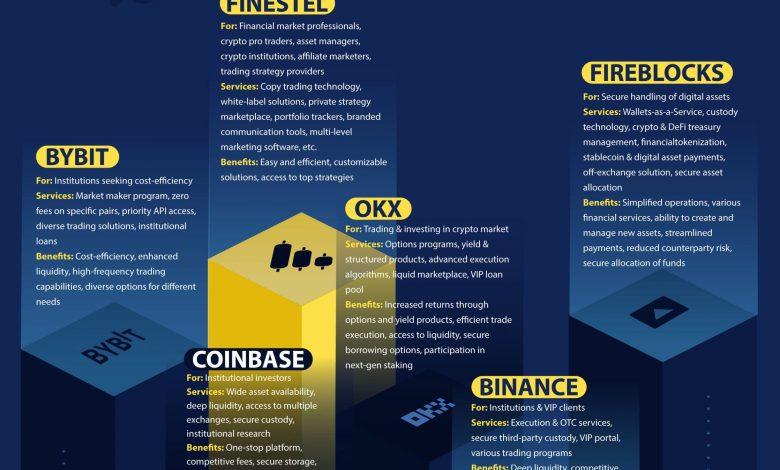The Top Crypto Exchanges in 2024: Features and Fees

- Introduction to Crypto Exchanges
- Key Features to Look for in Crypto Exchanges
- Comparison of Top Crypto Exchanges in 2024
- Understanding the Fee Structures of Crypto Exchanges
- Tips for Choosing the Right Crypto Exchange
- Future Trends in Crypto Exchange Platforms
Introduction to Crypto Exchanges
Cryptocurrency exchanges play a crucial role in the digital asset ecosystem, serving as platforms where users can buy, sell, and trade various cryptocurrencies. These exchanges provide a marketplace for investors and traders to exchange their digital assets, offering a wide range of features and services to meet the diverse needs of the crypto community.
When choosing a crypto exchange, it is essential to consider factors such as security, fees, liquidity, and user experience. Different exchanges offer varying levels of security measures to protect users’ funds and personal information. Additionally, fees can vary significantly between exchanges, with some charging flat fees per trade and others using a percentage-based fee structure.
Liquidity is another critical factor to consider when selecting a crypto exchange. High liquidity ensures that users can easily buy and sell cryptocurrencies without experiencing significant price fluctuations. A user-friendly interface and responsive customer support can also enhance the overall trading experience on a crypto exchange.
In this article, we will explore some of the top cryptocurrency exchanges in 2024, highlighting their key features and fee structures. By understanding the offerings of these exchanges, investors and traders can make informed decisions when choosing a platform to trade cryptocurrencies.
Key Features to Look for in Crypto Exchanges
When choosing a crypto exchange, there are several key features to consider that can greatly impact your trading experience. It is important to look for exchanges that offer **high liquidity**, **low fees**, **strong security measures**, **a wide range of cryptocurrencies**, and **user-friendly interfaces**.
**High liquidity** is essential for ensuring that you can easily buy and sell cryptocurrencies without causing significant price fluctuations. Exchanges with high trading volumes typically have better liquidity, making it easier to execute trades quickly and at competitive prices.
**Low fees** are also crucial when selecting a crypto exchange. High trading fees can eat into your profits, so it is important to choose an exchange that offers competitive fees. Look for exchanges that have transparent fee structures and offer discounts for high-volume traders.
**Strong security measures** are paramount when dealing with cryptocurrencies. Look for exchanges that offer **two-factor authentication**, cold storage for funds, and regular security audits to protect your assets from hackers and other threats.
A **wide range of cryptocurrencies** is another important feature to consider when choosing a crypto exchange. The more coins and tokens a platform supports, the more trading opportunities you will have. Look for exchanges that offer a diverse selection of cryptocurrencies to trade.
Finally, **user-friendly interfaces** can make a big difference in your trading experience. Look for exchanges that are easy to navigate, offer advanced trading tools, and provide responsive customer support. A user-friendly interface can help you make informed trading decisions quickly and efficiently.
In conclusion, when evaluating crypto exchanges, be sure to consider factors such as liquidity, fees, security, cryptocurrency selection, and user interface. By prioritizing these key features, you can find an exchange that meets your trading needs and preferences.
Comparison of Top Crypto Exchanges in 2024
In 2024, the top cryptocurrency exchanges continue to offer a wide range of features and competitive fees to attract traders and investors. Let’s compare some of the leading platforms to help you make an informed decision on where to trade your digital assets.
**Binance**: Binance remains one of the most popular exchanges in the market, known for its extensive selection of cryptocurrencies and low trading fees. The platform also offers advanced trading options for experienced users, making it a top choice for both beginners and seasoned traders.
**Coinbase**: Coinbase is another well-established exchange that is known for its user-friendly interface and high level of security. While its fees may be slightly higher compared to other exchanges, Coinbase is a trusted platform that is ideal for those looking for a reliable and easy-to-use trading experience.
**Kraken**: Kraken is a reputable exchange that offers a wide range of cryptocurrencies for trading. With competitive fees and a strong focus on security, Kraken is a solid choice for those who prioritize safety and reliability in their trading activities.
**Bitfinex**: Bitfinex is a popular exchange known for its advanced trading features and liquidity. While its fees may be higher compared to other platforms, Bitfinex is a preferred choice for professional traders who require access to a wide range of trading tools and options.
**Huobi**: Huobi is a global exchange that offers a diverse selection of cryptocurrencies and trading pairs. With competitive fees and a user-friendly interface, Huobi is a top choice for traders looking for a reliable and efficient trading platform.
In conclusion, each of these top cryptocurrency exchanges has its own unique features and benefits. It is essential to consider your trading preferences and requirements when choosing the right platform for your cryptocurrency trading activities in 2024.
Understanding the Fee Structures of Crypto Exchanges
Understanding the fee structures of cryptocurrency exchanges is crucial for investors looking to maximize their profits. Different exchanges have varying fee models that can significantly impact the overall cost of trading. It is essential to carefully examine these fee structures before choosing a platform to ensure that you are getting the best value for your money.
Some exchanges charge a flat fee for every trade, while others use a percentage-based fee that is calculated based on the size of the transaction. Additionally, some exchanges offer discounts on fees for high-volume traders or users who hold a certain amount of their native token. Understanding these fee structures can help you make informed decisions about which exchange to use for your trading activities.
In addition to trading fees, it is essential to consider other costs associated with using a cryptocurrency exchange, such as deposit and withdrawal fees. These fees can vary widely between exchanges and can significantly impact your overall profitability. Some exchanges offer free deposits and withdrawals, while others charge a fee for each transaction. Be sure to factor these costs into your decision-making process when choosing an exchange.
Overall, understanding the fee structures of cryptocurrency exchanges is essential for investors looking to optimize their trading experience. By carefully examining these fees and considering all associated costs, you can ensure that you are getting the best value for your money when trading cryptocurrencies. Make sure to research and compare different exchanges to find the one that offers the most competitive fee structure for your trading needs.
Tips for Choosing the Right Crypto Exchange
When choosing the right **crypto exchange**, there are several factors to consider to ensure you are making the best decision for your **cryptocurrency** trading needs. Here are some tips to help you navigate the selection process:
1. **Security**: Prioritize **security** features such as two-factor authentication, cold storage for **digital assets**, and a solid reputation for safeguarding user funds.
2. **Fees**: Compare **fees** across different **exchanges** to find a platform that offers competitive rates for trading, deposits, and withdrawals.
3. **Liquidity**: Opt for an **exchange** with high **liquidity** to ensure you can easily buy and sell **cryptocurrencies** without significant price slippage.
4. **User Interface**: Look for an **exchange** with an intuitive and user-friendly interface that makes it easy to navigate the platform and execute trades efficiently.
5. **Customer Support**: Choose an **exchange** that offers responsive customer support to address any issues or concerns you may encounter while trading **cryptocurrencies**.
6. **Regulation**: Consider **regulatory** compliance and choose an **exchange** that operates within the legal framework of your jurisdiction to protect your **investments**.
By keeping these tips in mind, you can select the right **crypto exchange** that meets your needs and helps you achieve your **trading** goals in the ever-evolving world of **cryptocurrency**.
Future Trends in Crypto Exchange Platforms
In the future, crypto exchange platforms are expected to continue evolving to meet the growing demands of users. One trend that is likely to gain traction is the integration of advanced security features to protect users’ assets from cyber threats. This includes the implementation of multi-factor authentication, biometric verification, and cold storage solutions to safeguard funds.
Another emerging trend is the expansion of trading pairs and supported cryptocurrencies on exchange platforms. As the crypto market becomes more diverse, users are seeking access to a wider range of digital assets for trading and investment. Exchanges that offer a diverse selection of trading pairs and tokens will likely attract more users looking to diversify their portfolios.
Furthermore, decentralized exchanges (DEXs) are expected to become more popular in the coming years. DEXs allow users to trade directly with one another without the need for a central authority, providing greater privacy and control over their funds. As regulatory scrutiny increases in the crypto space, DEXs may offer a more decentralized and censorship-resistant alternative to traditional exchanges.
Overall, the future of crypto exchange platforms is likely to be characterized by enhanced security measures, increased asset diversity, and the rise of decentralized trading solutions. Users can expect a more robust and user-friendly trading experience as exchanges continue to innovate and adapt to the evolving crypto landscape.



